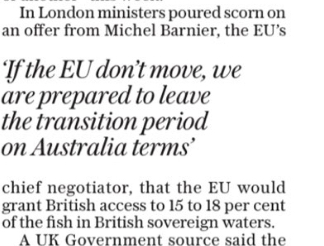
The story of Brexit and a @tconnellyRTE tweet. (Thread)
https://twitter.com/hendopolis/status/1332804784252997635
We know very little about what’s going on at the Brexit table, but yesterday @tconnellyRTE reported movement on fish.
https://twitter.com/tconnellyRTE/status/1332296730193371136?s=20
Read carefully. What does this mean?
My reading is: 15-18% of the current EU quota is proposed to be shifted to the UK. Whether that’s 15-18% of fish or 15-18% of the quota I don’t know. But it is supposed to be on top of what the UK already has. What does the UK have? Who knows. And apparently ...
It also depends on the fish. So... it’s complicated.
Anyway. The proposal was rejected straight away.
https://twitter.com/Barnes_Joe/status/1332305893216620545?s=20
In short: public discourse is a mess.
Was the EU offer generous or terrible? I do not know. I’d have to know existing quotas, industry capacity, speak to stakeholders. But the fact that discourse equates 18% on top of the existing share with 18% overall makes you wonder whether anything matters.
• • •
Missing some Tweet in this thread? You can try to
force a refresh




